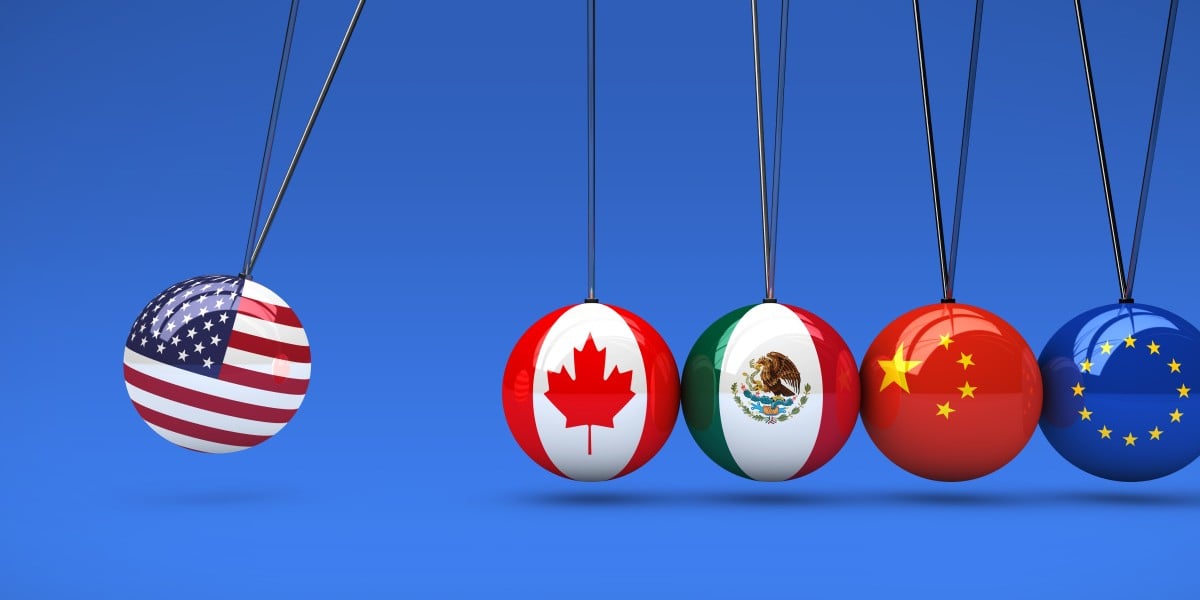US Stocks Slip As Trump Pulls Trigger On Canada, Mexico, China Tariffs

Updated US stock markets have dipped after President Donald Trump confirmed the imposition of a 25 percent tariff on most goods coming into America from Canada and Mexico, and an extra ten percent tariff on China.
"Tomorrow the tariff of 25 percent on Canada and 25 percent on Mexico and that'll start," Trump said during a Monday press conference. "So what they're going to have to do is build their car plants and other things in the United States, in which case they have no tariffs. The tariffs are all set, they go into effect tomorrow."
These import taxes, which have been looming since late last year, are usually passed onto the end buyer, meaning the price of stuff coming into the USA from what was a key ally Canada, as well as Mexico and China, is going up for Americans.
While promising tariffs from Tuesday, Trump also said TSMC has vowed to plow more investment into the United States; the Taiwanese chipmaker said that means it's increasing its spending in the US from $65 billion to $165 billion.
Trump said such a deal was emblematic of his campaign to bring manufacturing back to America after decades of offshoring, and will mean TSMC is exempt from tariffs.
It’s unclear if that exemption will apply immediately. Let’s hope so, because as we warned in November, importers of tech hardware pay those tariffs and usually pass the extra costs on by hiking prices for buyers. Acer has already said it'll be raising its prices by 10 percent in response. Dell last week told investors it sees tariffs as a cost it will need to reflect in its pricing.
The Register asked a dozen resellers to comment about the effect of tariffs on pricing, and all declined to speak on the record. Those that would speak on background expressed concern that their already thin margins mean prices they charge must increase. Some said they had increased import orders in recent months to build up inventory of product before any tariffs are imposed, but that kit will eventually sell and then prices will rise.
Hardware manufactured in the US would be immune from tariffs, and the White House hopes this will see tech companies build factories on US soil, bringing jobs and other boosts to the nation.
We do wonder, however, how the administration will treat a factory that builds finished products in the US using imported components. Replicating the entire supply chain for complex products such as servers or smartphones could take decades. Then there are some things, particularly in the automotive world, that are partially assembled in America from foreign parts, then send abroad for more work, then returned to the US for further assembly, with this back and forth happening multiple times.
- Acer signals 10% laptop price hike in US, blames Trump's extra China tariff
- Cisco says it's already dug in to protect itself – and customers – if trade war breaks out
- Lenovo isn't fussed by Trumpian tariffs or finding enough energy to run AI
- China sticks antitrust probe into Google amid retaliation for Trump import tariffs
The Canadian tariffs are expected to be limited to 10 percent on fuel, electricity, and uranium imports (the frozen north is America's biggest oil supplier) though all other goods will face a 25 percent tariff. All imports from Mexico will cost companies an extra 25 percent as of midnight, unless the President changes his mind.
When Trump introduced the tariffs last month the official explanation was, as well as the aforementioned drive to on-shore manufacturing, that neither Canada nor Mexico was doing enough to stop drugs and illegal immigrants from entering the US. The economic warfare was put on hold for a month of negotiations but now, it appears, the gloves are off.
Trump also said he was doubling the across-the-board tariff on general Chinese imports to 20 percent. In a Truth Social post he told US farmers to "have fun" with the new deal.
Wall Street reacted badly to the news today. Major indices, such as the Dow Jones, S&P 500 and NASDAQ composite all dropped within hours of the announcement, dipping 1.48 percent, 1.76 percent, and 2.64 percent respectively.
Canada, which for one pushed back on claims it's not doing enough at the border, and Mexico have said they will retaliate with their own tariffs on US goods. ®
Updated to add on March 6
After tanking the markets with his tariffs, President Trump has now delayed levies on selected imports from Mexico and Canada for a month.
From Chip War To Cloud War: The Next Frontier In Global Tech Competition
The global chip war, characterized by intense competition among nations and corporations for supremacy in semiconductor ... Read more
The High Stakes Of Tech Regulation: Security Risks And Market Dynamics
The influence of tech giants in the global economy continues to grow, raising crucial questions about how to balance sec... Read more
The Tyranny Of Instagram Interiors: Why It's Time To Break Free From Algorithm-Driven Aesthetics
Instagram has become a dominant force in shaping interior design trends, offering a seemingly endless stream of inspirat... Read more
The Data Crunch In AI: Strategies For Sustainability
Exploring solutions to the imminent exhaustion of internet data for AI training.As the artificial intelligence (AI) indu... Read more
Google Abandons Four-Year Effort To Remove Cookies From Chrome Browser
After four years of dedicated effort, Google has decided to abandon its plan to remove third-party cookies from its Chro... Read more
LinkedIn Embraces AI And Gamification To Drive User Engagement And Revenue
In an effort to tackle slowing revenue growth and enhance user engagement, LinkedIn is turning to artificial intelligenc... Read more

